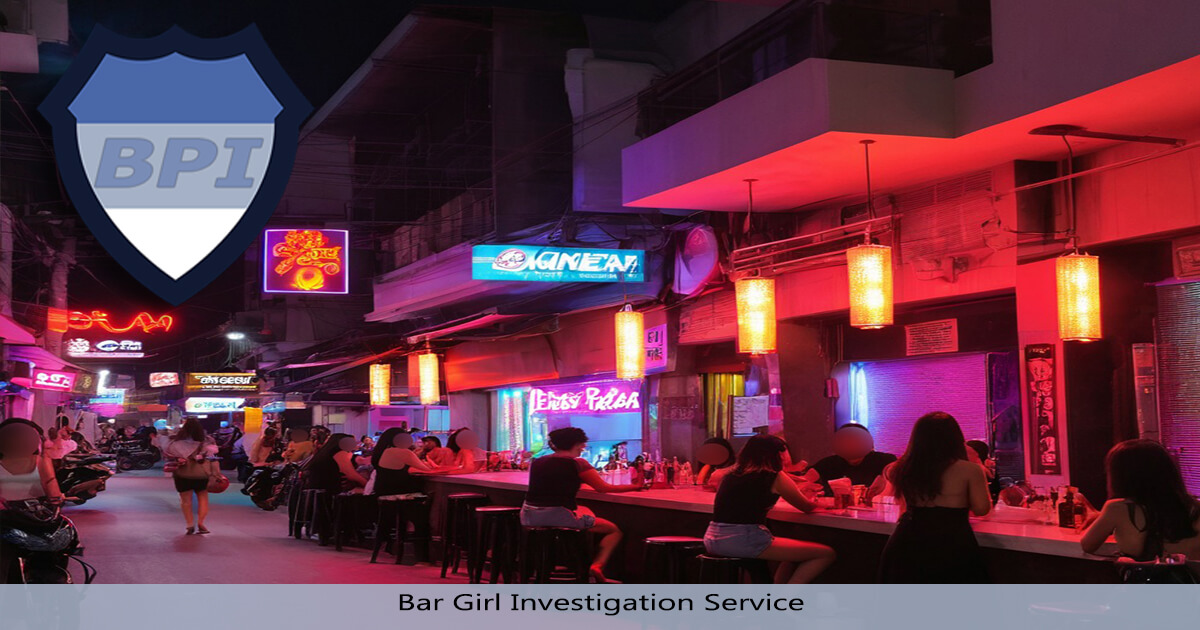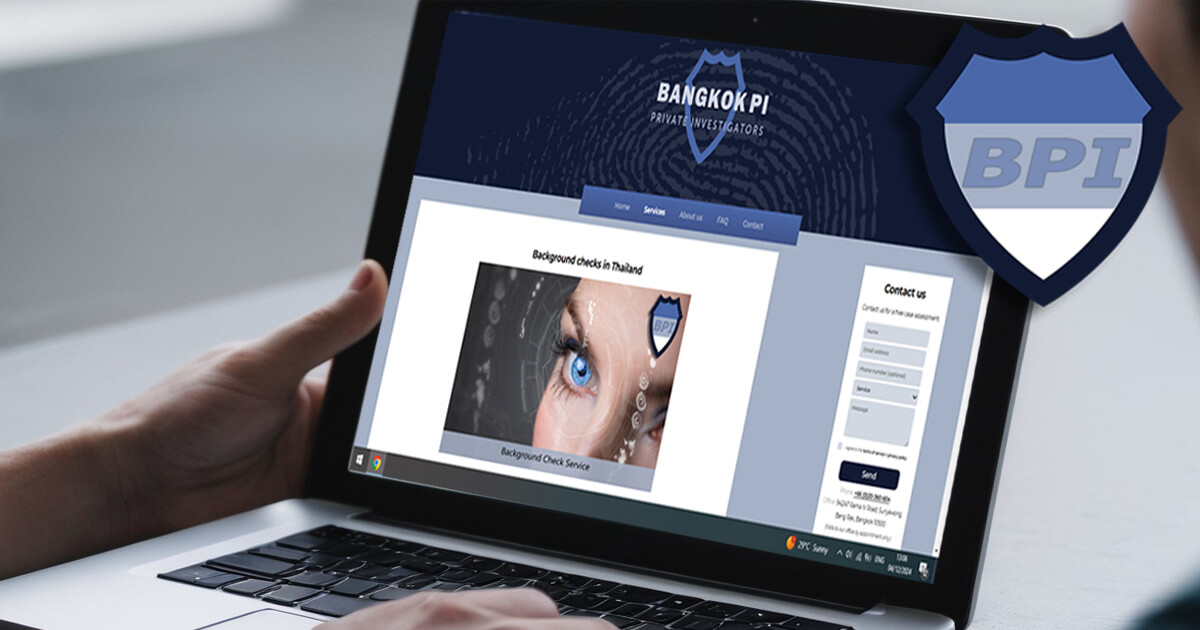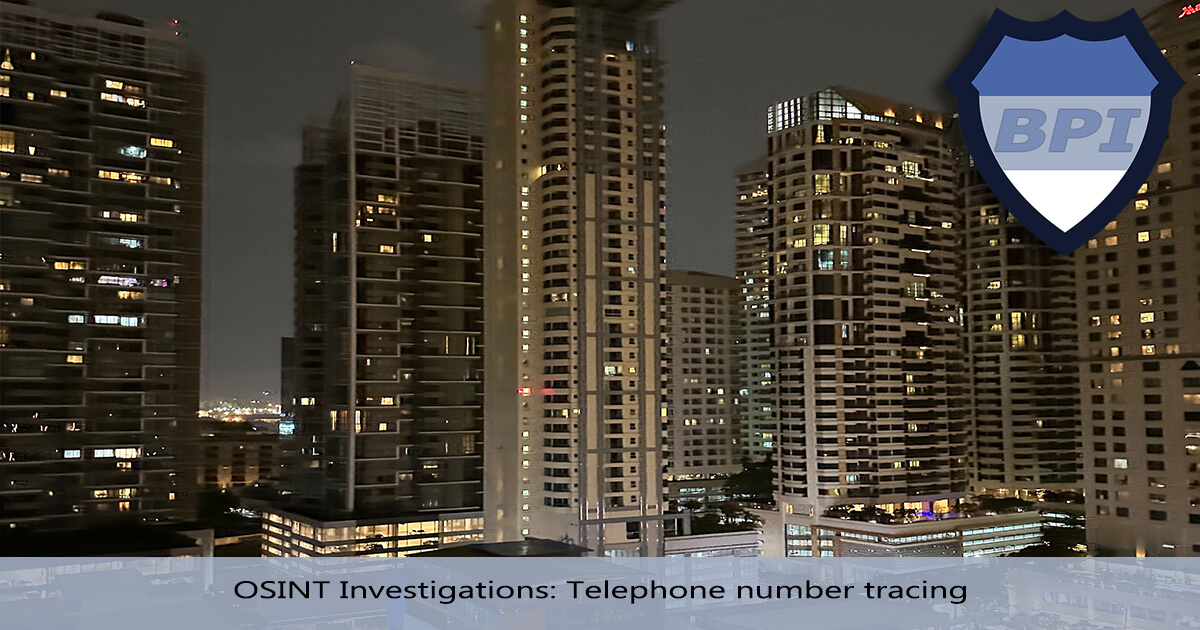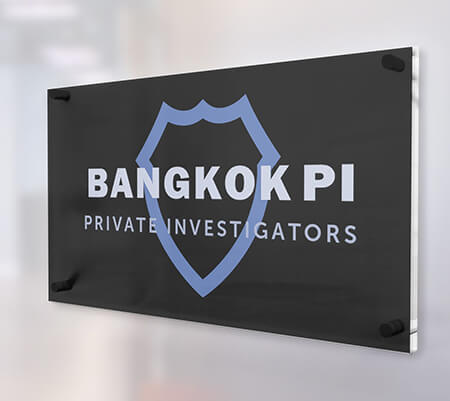Investigating My Thai Girlfriend in Bangkok: A Case Study
November 16, 2024 - Reading time: 6 minutes
Updated: December 4, 2024
When I first met “Ploy” online, I was sure I’d found someone truly special. She worked at a bar on Soi Cowboy in Bangkok, an area famous for its vibrant nightlife and infamous reputation. Ploy assured me her role was limited to serving drinks and chatting with customers. She insisted she’d never engage in anything inappropriate, like accompanying customers to their hotel rooms or “pay-for-play” arrangements.
She would make a phone call to me at the same time every night after work after work as a way to prove her honesty, and this gave me a great sense of security.

We talked constantly, day and night. I even started sending her money to support her family and improve their home in the village. But despite her reassurances, something didn’t feel right. Everywhere I looked online, I found warnings about dating Thai bar girls, including stories of men falling victim to scams. I wondered, could I really trust her? Was Ploy different—or was I just another target?
To find answers and check my Thai girlfriend’s honesty, I hired Bangkok Investigators. From the very first interaction, their team was understanding, professional, and discreet. I explained my situation, and they quickly devised a tailored plan to investigate my Thai girlfriend’s claims.
Unveiling the Truth: The Investigations Begin
The Honeytrap Investigation
The team suggested starting with a honeytrap investigation—a carefully planned decoy approach. The idea was simple: send someone to her bar and see how she reacted to their advances, in the way that any normal customer would approach and speak to a bar girl.
On the first attempt, Ploy wasn’t at work. When I asked her about it, she insisted she’d been at the bar as usual. It seemed odd, but I decided to give her the benefit of the doubt.
A few nights later, the investigator returned to the bar, only to find she was absent again. This time, bar staff revealed she wasn’t even in Bangkok—she had returned to her home village. Yet, over the phone, she continued telling me she was working every night. She continued to send messages and call daily, but claimed that she was still in Bangkok.
The Third Attempt: A Shocking Discovery
Determined to uncover the truth and investigate my Thai girlfriend further, I requested a third honeytrap attempt. This time, Ploy was present.
The undercover investigator struck up a conversation, posing as a customer. To my shock, she agreed to leave the bar with him for “short time” services. She even admitted she’d spent the previous nights with an older German man.
The final blow? She shared her number with the investigator and later messaged him, claiming she was single and interested in pursuing something serious. She even told the agent that she wanted a boyfriend so that she could stop working at the bar. I couldn’t help but wonder—how many men was she juggling? How many foreign boyfriends were sending her money, just like I was? She had no intention of stopping her work in the bar, due to the amount of money she was able to make there.

Learn more about Bar Girl Investigations.
Lessons Learned: Protect Yourself When Dating a Thai Girlfriend
This experience was a harsh wake-up call. For months, I believed her nightly reassurances that she was different from the stereotypes surrounding Thai bar girls. But the investigation revealed a much darker reality.
If you’re dating a Thai woman—especially one connected to Bangkok’s nightlife—taking precautions is crucial. Whether you need to investigate a Thai girlfriend or simply verify her honesty, it’s important to recognise the risks of scams. I now realize that while we dated online, she could have told me almost anything and I would not have known whether or not she was being truthful. While many relationships are genuine, others can be elaborate schemes designed to extract financial support.
Why Choose Bangkok Investigators?
Hiring Bangkok Investigators was the best decision I made. Their discreet yet thorough approach gave me the clarity I desperately needed. Here’s why I recommend their services:
- Fast and Efficient: Their team wasted no time in addressing my concerns.
- Discreet Investigations: Every step was conducted with the utmost professionalism.
- Actionable Insights: They provided undeniable evidence, allowing me to make an informed decision about my relationship.
If you’re in a similar situation—unsure about your Thai girlfriend’s intentions or needing to check your Thai girlfriend’s activities—don’t wait. Contact Bangkok Investigators today. A small step now can save you from future heartbreak and financial loss.
Related Articles
Why Do Thai People Use Fake Names on Social Media?
November 3, 2024 - Reading time: 7 minutes
Updated: December 4, 2024
Thai social media users often go by aliases, nicknames or fake names, a unique aspect of Thai culture that’s common across Southeast Asia. While nicknames are used worldwide, they have deeper significance in Thailand, where nearly everyone has a lifelong nickname. This habit makes online identities harder to trace, presenting challenges for private investigations or those looking to conduct OSINT research on Thai citizens.

Learn more about our background check service.
Why Do Thai People Use Nicknames?
Thai nicknames often stem from tradition. Historically, families gave babies nicknames to confuse evil spirits, believing these names protected their children. Over time, this practice became an enduring custom, and today, nicknames are often as unique and quirky as the individual. Given that nicknames are frequently used in place of formal names, especially on social media, many Thai profiles display names unrelated to their legal identities.
The Rise of Fake Names and Aliases on Social Media
Beyond traditional nicknames, it’s now common to see entirely fictitious names on Thai social media. Many people adopt these names to maintain privacy, avoid detection, or express creativity. This widespread use of aliases complicates efforts for anyone seeking to identify or contact them directly. As a result, OSINT-style investigative work that relies on social media can be time-consuming and complex, particularly if the search is based solely on legal names, or if the subject’s legal name is unknown.
As a leading detective agency in Thailand, we often encounter the challenge of Thai social media users adopting fake or alternate names, making it harder to trace their true identities. Our investigative approach is always tailored to each case, taking into account the circumstances and any available information. We carefully consider why our client seeks to locate the subject, along with any additional details they provide or that we uncover during our assessment.
Challenges for Investigators
In investigations across Thailand and Southeast Asia, fake names and aliases can make tracing individuals through social media very difficult. Here’s how these aliases impact various investigative scenarios and how Bangkok Investigators approaches these obstacles:
1. Privacy through False Names
Sometimes, the alias serves as a privacy tool. For example, an individual involved in a business transaction may use a fake name online, making it challenging to confirm their identity. Investigators then have to bridge the gap between the online persona and the person’s legal identity, often requiring creative methods to make these connections.
2. Nicknames to Avoid Recognition
In cases of fraud or missing persons cases, a subject might use a very common nickname to (inadvertently or intentionally) avoid recognition. When the name is too generic, such as “Noi” or “Lek,” it becomes nearly impossible to track down any unique information, unless other details are available. In these instances, investigators rely on indirect clues like mutual friends, profile images, and tagged locations to narrow down the correct profile.
3. Aliases in Relationships
For cases of suspected infidelity, a subject may create an alternate social media profile with a fake name. This alias often allows them to maintain relationships without their partner’s knowledge, making it harder for investigators to uncover. By analysing factors like tagged photos, location data, and shared connections, investigators can sometimes link the alias back to the subject.
Names in Thai Script vs. English Letters
For Thai citizens, official records in Thailand exclusively use Thai script for their names (for example: จอห์น สมิธ). While some identification documents may include a version of the name in English letters, this is typically an automated phonetic translation that doesn’t hold any official status in Thai records. Therefore, for researching or tracing Thai citizens, it’s essential to have the name in Thai script, as no official records exist for Thai citizens under English spellings.
Translating a name from English to Thai can also be challenging due to the unique Thai alphabet, with its extensive array of characters and phonetic nuances. This makes finding accurate matches or performing a trace more complex when only an English name is available (when the name itself is genuine).
Investigative Tools to Bypass Nicknames
Given these challenges, we can use a range of tools to verify identities beyond names alone:
- On The Ground (HUMINT) Investigations: In many cases it can be helpful to physically deploy an agent in order to gather information by conducting interviews in person.
- Facial Recognition: Useful for linking different profiles or discovering new profiles/media, even when the subject is using a fictitious name.
- Network Connections: An individual’s social connections often lead to valuable clues about their true identity.
- Tagged Locations and Check-ins: Location data on social media posts can confirm a person’s movements and affiliations, which may provide scope for further investigation.
- Behavioural Patterns and Interests: Hobbies and interests can help narrow down profiles to those of the actual subject.
Why Choose Bangkok Investigators?
With years of experience navigating the intricacies of Thai social media, we offer expert investigations that look beyond names. Our methods reveal the truth, no matter how elusive the individual may be.
Reach out for a free, no-obligation quote, and let’s discuss how our background checks and social media investigations can give you the answers you’re looking for.
Related articles
How to Trace Phone Numbers in Thailand: What You Need to Know
October 24, 2024 - Reading time: 8 minutes
Updated: June 3, 2025

Tracing phone numbers in Thailand can be a complex task, but with the right expertise and resources, it’s often possible to uncover valuable information. Whether you’re trying to identify an unknown caller, verify details for personal or business reasons, or gather information for legal matters, tracing a phone number could be the key to resolving your situation.
At Bangkok Investigators, we offer professional phone number tracing services across Thailand using OSINT (Open Source Intelligence) techniques. OSINT refers to data that is publicly available, so everything we uncover is from legal, public sources, ensuring that our methods are fully compliant with privacy laws.
• We do NOT provide live GPS phone tracking or hacking services.
• Our phone-number tracing is limited to open-source records such as the registered owner's name and other publicly available data.
• If you are seeking real-time location data or any service that violates Thai privacy law, do not submit an enquiry.
Why Online Phone Books Don’t Always Help
While many people hope to find a simple answer by using an online phone book or directory, the reality is that reliable online resources in Thailand are limited. Unlike some other countries, where comprehensive online directories and reverse phone lookup tools are readily available, Thailand doesn’t offer easy access to such databases. Information is often fragmented, outdated, or simply unavailable to the public.
If you’ve tried to trace a phone number using online searches or through an online phone book in Thailand, you may have noticed that there are few dependable resources. This lack of accessible databases can make phone number tracing difficult for someone who isn’t familiar with the methods and tools required.
That’s where we come in. Our team of private investigators is skilled in navigating these challenges, using advanced OSINT techniques to gather data that may not be available to the average person online. We can save you time, frustration, and help ensure you get accurate results.
How Our Phone Number Tracing Service Works
Not all phone numbers can be traced, but in many cases, we can determine whether or not we’ll be able to gather useful information on a number before any charges are incurred. Our approach allows us to offer a free, no-obligation quote for every enquiry.
-
Initial Enquiry: When you contact us, we’ll ask for basic details, such as the phone number in question, the person you’re trying to trace, and the reason behind the search. This is important as it helps us determine if we are able to assist you, and it also ensures the data will be used appropriately.
-
Feasibility Check: Using OSINT techniques, we conduct a quick check to see if the phone number can potentially yield information. This process is completely free. If we find that we can trace the number and gather data, we’ll provide you with a quote for the service.
-
Data Acquisition: Once the quote is agreed upon, we proceed with acquiring the relevant data. Depending on the circumstances, this could involve identifying the person linked to the phone number, confirming their location, or gathering other relevant details. Each case is different, and the amount of data we can acquire varies accordingly.
Why Choose Us?
• OSINT-Based Investigations: We use reliable and legal methods to trace phone numbers, so you can trust that our findings are accurate and lawfully obtained.
• Free Quotes: We’ll always let you know upfront whether we’re able to help and what the cost will be. If we can’t trace the number, there’s no charge.
• Tailored Services: Every case is unique, and we adjust our approach based on your specific needs. Whether it’s for personal, business, or legal reasons, we’ll tailor the investigation accordingly.
• Comprehensive Investigative Services: We offer a range of investigative services across Thailand, and will be able to assist whichever direction your case takes.
Free Tools for Tracing Thai Phone Numbers?
In Thailand, tracing a phone number on your own can be quite challenging due to the lack of comprehensive online phone books or directories. While websites like SYD can provide some basic information with a reverse phone number search, such as the carrier and location for landline numbers, tracing a name from a phone number or obtaining more detailed information about the individual generally requires more advanced methods.
This is where we come in. Our expertise and resources allow us to trace phone numbers more effectively and accurately than standard online searches, providing access to information that is not readily available to the public.
Common Reasons to Trace a Phone Number
There are a number of reasons why you might need to trace a phone number in Thailand, including:
• Unknown Callers: If you’ve been receiving unwanted or suspicious calls, tracing the number can help you identify the caller and take appropriate action.
• Fraud Prevention: If you’re concerned about fraud or scams, tracing a phone number can help verify if the person or business behind the number is legitimate.
• Legal or Personal Reasons: Whether it’s a legal dispute, locating a missing person, or verifying someone’s identity, phone number tracing can provide essential information.
Get Your Free Quote
If you need to trace a phone number in Thailand, we’re here to help. Just submit a ticket through our website with the relevant details, and we’ll get back to you as soon as possible with a free quote. Remember, the more information you provide us (such as why you need to trace the number and how you plan to use the data), the more efficiently we can assist you.
While not every phone number can be traced, we’ll do our best to offer you the information you need or let you know if it’s not possible.
Contact Us
For reliable phone number tracing in Thailand, get in touch with us today. We’re committed to providing transparent, ethical services tailored to your individual circumstances. Let us help you find the answers you’re looking for.
With limited online resources in Thailand, trying to trace a phone number on your own can be challenging. Hiring a professional investigator ensures you’re using legal, reliable methods that yield results.
Related articles
How Many Agents Do You Need for Surveillance Investigations?
October 8, 2024 - Reading time: 6 minutes
Updated: June 8, 2025
The Importance of Choosing the Right Number of Agents for Effective Surveillance
When it comes to private investigations, particularly those requiring personal surveillance, the number of agents deployed can significantly impact the success of the operation. In many cases, the police, when placing someone under surveillance, employ a team of half a dozen or more agents. This ensures continuous monitoring over extended periods—be it hours, days, or even months—allowing them to effectively track the subject's movements without arousing suspicion.
At Bangkok Private Investigators, we understand the importance of thorough surveillance. While we are capable of assembling large surveillance teams similar to those used by law enforcement, we recognise that such operations are often beyond the budget of many of our clients. Consequently, we are frequently instructed to conduct surveillance with one or two agents. However, it is crucial to appreciate the limitations of using fewer agents, especially during complex investigations.
The Role of a Single Agent in Surveillance
A single agent is best suited for static surveillance, where the focus is on monitoring a specific location, such as a residence or workplace. This type of surveillance involves the agent remaining stationary, observing the comings and goings at a particular property without the need to follow the subject from place to place. Static surveillance is an effective method for gathering evidence of activities at a fixed location, and a single agent can perform this role discreetly and efficiently.
However, when the investigation requires following a subject across multiple locations, the limitations of using only one agent become apparent. The primary challenge arises from the difficulty of maintaining a consistent tail without drawing attention to the agent’s presence. In scenarios where the subject moves through crowded areas, uses public transport, or changes vehicles, a single agent may struggle to keep up without being detected or losing the subject altogether.

For police investigators, the prospect of using one agent to follow a subject for many hours, and across multiple different locations, would be not only be a laughable prospect for most investigators but also dangerous for the operative and risk compromising the investigation.
The Advantages of Deploying Two Agents
For dynamic surveillance needs, such as tracking a subject across various locations, deploying two agents is significantly more effective. Having two agents on the ground allows for seamless transitions in the event that the subject becomes suspicious. If one agent believes they are being observed or if the subject begins taking evasive actions, the second agent can discreetly take over, ensuring continuous monitoring without arousing suspicion.
Furthermore, when following a vehicle, a two-agent team is far more adaptable. If the subject were to take a taxi, for example, it is likely that the taxi would stop in traffic, allowing the subject to exit and walk away. A single agent would need to park their vehicle before continuing on foot, often resulting in the loss of the subject. With two agents, one can follow the subject on foot while the other parks the vehicle, minimising the risk of losing sight of the target.
A Cautionary Tale: The False Economy of Using One Agent
To illustrate the risks of using only one agent, consider a recent case where a client, seeking to save money, instructed us to conduct an infidelity investigation with just one agent. Surveillance was performed for several hours before the subject eventually left their home to go out. During a critical moment in the surveillance, the subject unexpectedly changed vehicles and then proceeded on foot through a crowded marketplace. Despite the agent's best efforts, they were unable to park quickly enough to continue following on foot, and the subject was lost.

As a result, the investigation's effectiveness was compromised, and the client did not receive the conclusive evidence they were hoping for. In this case, the decision to use only one agent proved to be a false economy, as the desired outcome was not achieved. Had two agents been deployed, the chances of successfully tracking the subject would have been significantly higher.
Maximising Surveillance Success
At Bangkok Private Investigators, we always strive to provide our clients with the most effective and efficient surveillance services. While we understand the need to work within budgetary constraints, it is important to consider the potential limitations of using only one agent. Surveillance is a complex task with no guarantees of success; however, by deploying two agents, you significantly increase the likelihood of obtaining the results you need.
In summary, when planning surveillance, it is essential to weigh the benefits of using a larger team against the potential risks of limiting the number of agents. Investing in a more robust surveillance team may ultimately save time, money, and frustration by delivering more reliable outcomes.
For professional surveillance services tailored to your needs, contact Bangkok Private Investigators today.
Related articles
Search
Bangkok Investigators

Discover more about Bangkok Private Investigators on our homepage or by visiting our About Us page.